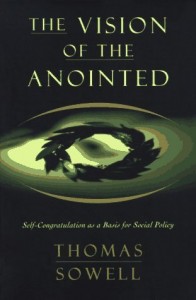 First, a confession: this was an angry purchase. From the impression given by the title alone, and a short blurb on the jacket, I knew that this book would function less as a stand-alone work of political philosophy and more of a companion piece to Sowell’s excellent A Conflict Of Visions. And I was right. Where A Conflict Of Visions is measured, abstract, even-handed, this book is accusatory, specific and, yes, angry. I wasn’t planning on reading it but, like I said, anger got the better of me, anger at what Sowell wryly terms “the Anointed,” those people so confident in their own moral superiority that they’re convinced that they can do no wrong, moral crusaders for an ever-receding cosmic justice too puffed up with self-importance to take into consideration – or even listen to – a dissenting argument. The locus of the Anointed is the modern university, where the humanities have been transformed into a fiefdom of pseudo-Marxists, but their particular brand of critical unthinking has penetrated the modern left and wreaked havoc on public discourse.
First, a confession: this was an angry purchase. From the impression given by the title alone, and a short blurb on the jacket, I knew that this book would function less as a stand-alone work of political philosophy and more of a companion piece to Sowell’s excellent A Conflict Of Visions. And I was right. Where A Conflict Of Visions is measured, abstract, even-handed, this book is accusatory, specific and, yes, angry. I wasn’t planning on reading it but, like I said, anger got the better of me, anger at what Sowell wryly terms “the Anointed,” those people so confident in their own moral superiority that they’re convinced that they can do no wrong, moral crusaders for an ever-receding cosmic justice too puffed up with self-importance to take into consideration – or even listen to – a dissenting argument. The locus of the Anointed is the modern university, where the humanities have been transformed into a fiefdom of pseudo-Marxists, but their particular brand of critical unthinking has penetrated the modern left and wreaked havoc on public discourse.
Who are the Anointed? What general characteristics do they share? In A Conflict Of Visions, Sowell’s nomenclature referred to the “constrained” and the “unconstrained” vision; here, the “constrained” vision becomes the tragic vision, and the “unconstrained” that of the Anointed. Those with the tragic vision are concerned with the limitations created by scarce resources, limited knowledge and an immutable human nature, and for this reason seek only the most beneficial (or least harmful) tradeoffs; those with the vision of the Anointed seek sweeping solutions to social problems, which they view as being exclusively the symptom of moral corruption among leaders and institutions. Sowell lists five distinct characteristics of this latter worldview:
1. Painful social situations (“problems”) exist not because of inherent limits to knowledge or resources, or inadequacies inherent in human beings, but because other people lack the wisdom or virtue of the anointed.
2. Evolved beliefs represent only a “socially constructed” set of notions, not reflections of an underlying reality. Therefore the way by which “problems” can be “solved” is by applying the articulated rationality of the anointed, rather than by relying on evolved traditions or systemic processes growing out of the experience of the masses.
3. Social causation is intentional, rather than systemic, so that condemnation is in order when various features of the human experience are either unhappy or appear anomalous to the anointed.
4. Great social or biological dangers can be averted only by the imposition of the vision of the anointed on less enlightened people by the government.
5. Opposition to the vision of the anointed is due not to a different reading of complex and inconclusive evidence, but exists because opponents are lacking, either intellectually or morally, or both.
The combination of these five suppositions, which lend themselves so easily to the spectacle of moral grandstanding that has become modern political debate, creates an orthodoxy, a set of beliefs that morally upright people adhere to uncritically. Oppose abortion? You must be against a woman’s right to choose. Dislike affirmative action? You are a racist, or, perhaps worse, you are blinded by your “white privilege.” White liberals think nothing of calling black conservatives “race traitors” or “Uncle Toms”; male feminists hurl invective at women who dare to challenge feminist orthodoxy. And all the while, actual debate – any meaningful discussion of the facts or weighing of the evidence – is cast aside, unasked for and unwanted.
This has been more rant than review, but I speak not as an angry conservative but as a betrayed liberal. The principles of liberalism that I most cherish – skepticism, free enquiry, open debate and a respect for the individual above all else – have been cast aside, and what has taken their place is not new or “progressive” but a re-branding of the same folly that characterized the French Revolution and Soviet Russia. I finish with a quote from Schiller that the Anointed would do well to take to heart: “The claims of experience refute all the well-meant attempts of philosophy to bring what the moral world demands into harmony with what the real world does.”